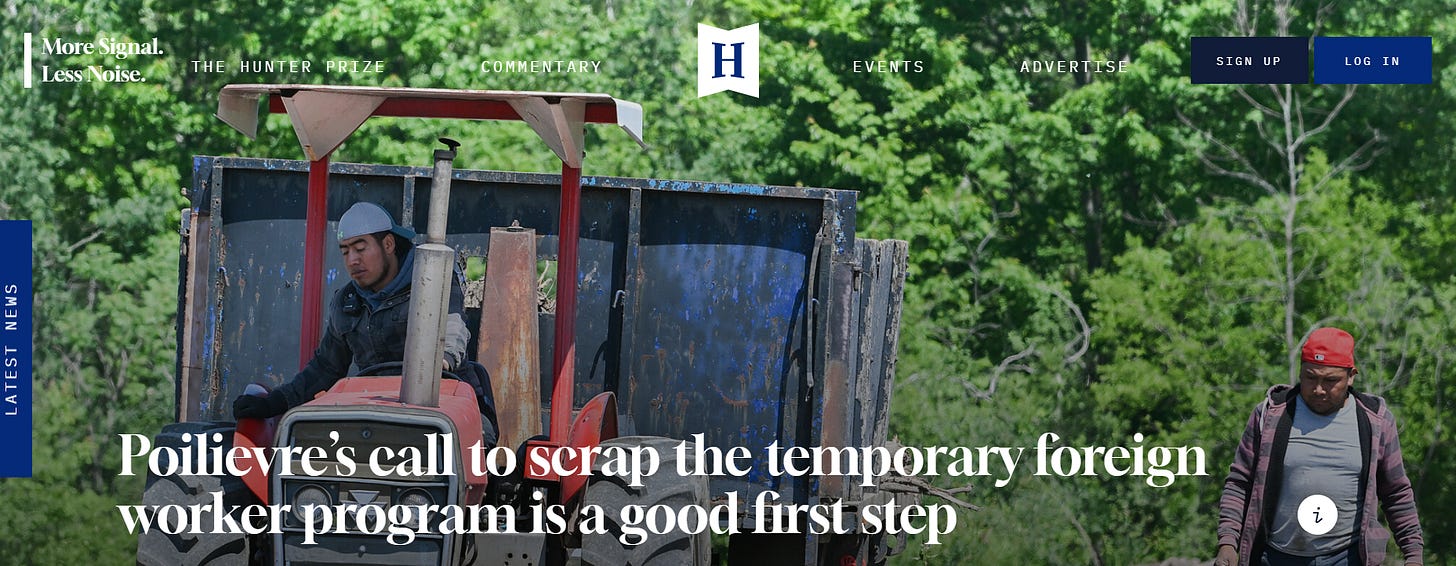Ending Canada's foreign worker scam
Recent features on Juno News and in The Hub, with special guest Dr. Michael Bonner.
In the latest episode of “Not ‘Sorry’” with Alexander Brown, Dr. Michael Bonner joins us to deliver a scathing expert analysis of the Liberals' broken immigration system, zeroing in on the Temporary Foreign Worker Program (TFWP) and International Mobility Program (IMP).
Bonner, who shepherded these files under then-Minister Jason Kenney and the Right Hon. Stephen Harper, exposes the economic distortions and ethical horrors in Canada's exploitation economy. Bonner calls for radical reform, starting with eliminating the TFWP for low-wage jobs — a pledge echoed by federal Conservatives last week, who vowed to scrap it entirely if elected.
But Bonner stresses this should be just the beginning: the IMP, which floods the market with international students without the need to prove a labour shortage, must also be overhauled. From 2019 to 2023, TFWP approvals jumped 88% and IMP permits by 126%, swelling to 1.58 million permit holders — 7% of Canada's workforce.
This fuels exploitation. TFWP workers endure squalid conditions, low pay, long hours, and employer bondage, while the IMP undercuts wages and sidelines Canadian youth amid record unemployment. Economically, these programs prop up inefficient industries with cheap labour, stifling innovation. Morally, they betray migrants and Canadians alike, turning immigration into indentured servitude.
Amid soaring joblessness and growing social unrest, now is the moment for all Canadian political leaders to show leadership on urgent immigration reform.
As Bonner argues, ending this debacle demands moral accountability.
It’s time to restore an immigration system that once again serves Canadians first.
Alexander Brown and Dr. Michael Bonner: Poilievre’s call to scrap the temporary foreign worker program is a good first step
Read in The Hub. (A longer version of this feature is expected in the coming days.)
Last week, the federal Conservatives announced their intention, should they form government, to abolish the Temporary Foreign Worker Program (TFWP). They also challenged the governing Liberals to do so immediately. We believe that this is a much-needed change of policy, for the simple reason that Canadian jobs should go to Canadians.
Yet abolishing the TFWP would only be a step in the right direction because it’s not the only immigration stream that allows foreign nationals access to our labour market in large numbers. It’s not the only stream that prices young Canadians out of the job market, suppresses wages, and is rife with abuse. The spirit of reform must ultimately extend more broadly.
The exploitative programs
It’s not hyperbole to say that Canada has built an entire economy on exploiting cheap, foreign labour through TWFP, as well as the International Mobility Program (IMP). These are two slightly different programs that allow foreign nationals to work in Canada, with most going to Ontario. But contrary to its name, there is nothing “temporary” about the TFWP. Its original purpose was to remedy proven labour shortages while Canadians were hired and trained to eventually do the jobs in question. Meanwhile, the IMP allows international students to work—with or without a proven labour shortage—while they’re studying in Canada.
Between 2019 and 2023, the TFWP increased by 88 percent and the IMP increased 126 percent. They account for close to 1.58 million work permit holders, equal to roughly 7 percent of Canada’s labour force.
Taken together, the results of the TFWP and IMP are deplorable. The TFWP allows foreign nationals to be recruited abroad in vast numbers, brought to Canada, housed in degrading conditions, paid the minimum wage, forced to work long hours, pressured into not joining a union, and required to work for only one employer. Yes, the IMP is more flexible, but it’s more pernicious because it does not even pretend to address labour shortages.
Both schemes are also of course bad for Canadians themselves. The problem is especially grievous for young Canadians trying to get started in the labour market. Canada lost 40,800 jobs this past July, the unemployment rate is now 6.9 percent, and youth unemployment (those between 15 and 24 years old) is now 14.6 percent.
Both the TFWP and IMP are used as business models. Hiring foreign nationals at minimum wage keeps prices low and profits high—most notoriously in the hospitality and trucking sectors, but no industry seems untouched now.
Addicted to cheap foreign labour
The use of the TFWP in the healthcare sector, for example, has grown by an appalling 1,700 percent since 2000. That dramatic rise has no doubt been abetted by the absence of uniform standards and credential recognition among Canadian provinces. If medical personnel could move easily from one province to another, shortages could be filled by Canadians. But historically this has not been possible, and so medical institutions have had to turn to the TFWP. Ontario’s recent determination to solve this problem by speeding up recognition of 50 “in-demand” professions from other provinces is a step in the right direction, and hopefully not too little too late.
Meanwhile, the IMP is a vehicle for outright fraud, ranging from fake acceptance letters from bogus “colleges” to elaborate human-trafficking schemes. Not long ago, nearly 50,000 holders of foreign student visas were working and attempting to settle here, rather than studying at any Canadian university or college. Most were migrants from India, and some were trying to cross the border illegally into the United States. The RCMP is now working with Indian law-enforcement to investigate alleged links between dozens of “colleges” in Canada and two “entities” in India allegedly facilitating passage into the U.S. When we reflect that an astounding 4.9 million temporary visas are set to expire this year, we have reason to believe that this abuse, exploitation, and fraud are on a much larger scale that we understand.
The consequences for young Canadians
Both the TFWP and the IMP serve to keep wages artificially low and profits high, and to price Canadians out of the job market. It wouldn’t be wrong to view these programs as distortionary government subsidies or welfare for unproductive businesses. The effects disproportionately harm younger Canadians who are priced out of the labour market, given that temporary workers overwhelmingly earn less than the median wage. And yet, we’re constantly hectored about labour shortages, Canadians’ “unwillingness” to do certain jobs, and the need for foreign workers.
It shouldn’t take much intellectual effort to see that the use of foreign labour and the difficulties of employing younger Canadians are two sides of the same ugly coin. Foreign workers are more cooperative because they are bound to their employers like serfs. They face normally insurmountable barriers to joining unions and have no attachment to the community in which they’re expected to work. In comparison, the domestic population is generally better educated and rooted in the local community.
Young Canadians can afford to be discriminating and should rightly expect higher wages than foreign nationals. Employers should instead work harder to invest in and reward their domestic workforce. In any other era, this would have been obvious. But now there is little incentive for businesses to look beyond cheap, foreign labour.
To get an idea of the magnitude of our collective failure here, consider the following fact. A 2024 study by RBC Economics revealed that Canadian businesses are sitting on a stockpile of cash worth almost a third of our country’s GDP. In other words, Canadian companies have the means to invest in hiring and training Canadians, but simply refuse to do so. The results of this refusal are stagnant wages, structural unemployment, and a de-skilling of the domestic population.
Time to say goodbye
Canada’s foreign labour crisis can be seen as perpetuating intergenerational injustice by sidelining Canadian youth. The result is a sense of alienation and despair that makes people call into question the very legitimacy of Canada’s social contract. Many Canadian youth, especially those burdened by student debt and high living costs, view government and business as having abdicated their role in the natural order of a high-trust society: to contribute to public cohesion and nurture a skilled workforce. Instead, they’ve opted for importing an easily exploitable foreign population in order to suppress innovation and wage growth.
Herein lies the case for the Conservatives’ announcement as a key starting point. The government should actually abolish all temporary labour schemes in all sectors of the economy—with the exception of certain areas, such as seasonal agriculture, where the TFWP has never been controversial.
Ottawa and the provinces must use every means at their disposal (from tax incentives to public praise) to reward businesses for hiring and training actual Canadians.
This is the least Canadians should be able to expect from business and government alike. The sooner things change, the better.
Alexander Brown is a columnist, director with the National Citizens Coalition, and a contributor to Project Ontario.
Dr. Michael Bonner is a former immigration policy advisor who once held the temporary foreign worker and international mobility files in Ottawa, and is a former Director of Policy within the Government of Ontario.
Young Men in Crisis: Reforming Immigration to Avert Radicalization
Alexander Brown in The Hub’s ‘Need to Know’ feature.
(This is the extended and original version of that piece.)
Canada's youth unemployment has surged to record highs, with students facing a staggering 22% rate — without the excuse of a pandemic response.
This crisis stems from systemic failures in immigration policy enacted during Covid, particularly the abuse-ridden Temporary Foreign Worker Program (TFWP), foreign-student streams, and asylum and in-land asylum processes. These have flooded the labour market with cheap, temporary workers, suppressing wages and blocking entry-level opportunities for Canadian graduates. AI advancements exacerbate this, rerouting career paths young people trained for.
The fallout is profound: delayed adulthood milestones like independence, homeownership, and family formation. Skyrocketing housing costs – our young would need to have access to a $65/hour+ minimum wage to match the purchasing power of Canada’s halcyon days — force many into unaffordable dog-crate apartments or prolonged parental dependence. In an increasingly digital, isolated world, this breeds alienation, eroding both confidence and social bonds.
Young men, hit hardest, are turning to potentially radical fringes. Groups like the ‘Dominion Society’ push "remigration" beyond deporting TFWP abusers or fraudulent claimants, with supporters veering into blanket calls to expel immigrants. Such rhetoric risks serving as a kind of honeypot for the vulnerable, while potentially derailing legitimate reform.
One can certainly make the case that mass immigration has been the most destructive policy blunder in this country’s history. Historically poor trendlines in jobs, housing affordability, healthcare wait-times, and a rise in violent crime all sit downstream from the decision to abandon the sensible in favour of spiking the GDP coming out of Canada’s pandemic response, suppressing wages, and experimenting with a country run as a post-national economic zone first, and a distinct society with standards and guard-rails second.
But calls for “remigration,” and announcing inspiration has been taken from “The Great Replacement,” is less a dog-whistle than a fog horn; and this group’s brazen call to revoke Permanent Residency status and naturalized citizenship is worse. We know what they mean when they say “heritage Canadian.” Canada may have been built by European settlers — Anglo and French — but not by they and they alone, and our demographic destiny changed long ago.
History warns us: idle hands, suppressed opportunities, and angry young men do not mix. Yet blame lies squarely with government and exploitative businesses, not broad immigrant scapegoating. Liberal policies have ballooned temporary residents to 3-5 million, prioritizing volume over integration. To stem this, Canada must enforce "temporary" status, deport those excesses, and restore a points-based system emphasizing skills and values — as under Harper's 2014 model.
Conservative Immigration critic Michelle Rempel Garner’s September 3rd announcement, to abolish the TFWP, is a good start, that builds on a summer of advocacy and calls for reform from groups like the Aristotle Foundation, the National Citizens Coalition’s ‘Canadians for Responsible Immigration’ campaign, and columns in The Hub from this writer, as well as from collaborative efforts from contributors to ‘Project Ontario.’
This is the moment to cut the TFWP down to size, to continue to reform the International Mobility Program, and to return to the prioritization of Canadian workers, particularly those yet to get off the launch pad, to rebuild opportunity and restore the promise of tomorrow. Failure invites ugliness: potentially radical coalitions could fracture consensus on sensible changes. Success means launching youth into productive lives, fostering upward mobility for the first time in years.
Policymakers must act urgently, and September demands accountability. Support for reform isn't just economic; we can all see the moral imperative behind stabilizing society and getting out ahead of worrying trends.








This is, of course, an incredibly dispiriting week for many, perhaps particularly in this sphere.
One can be heartbroken, depressed, scared even. But if you’re trying to leave the world a better place, and you’re worried about decline, and anger, and the radical, anti-civilizational forces that have failed so vociferously the past decade-plus — please, continue to do the work.
It’s what Charlie would have wanted.